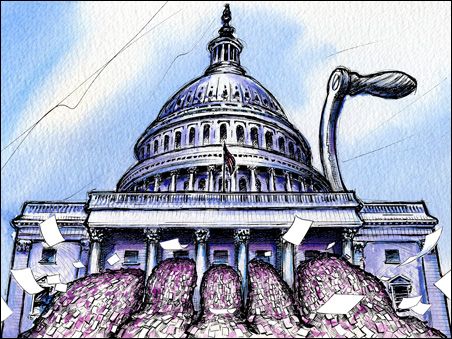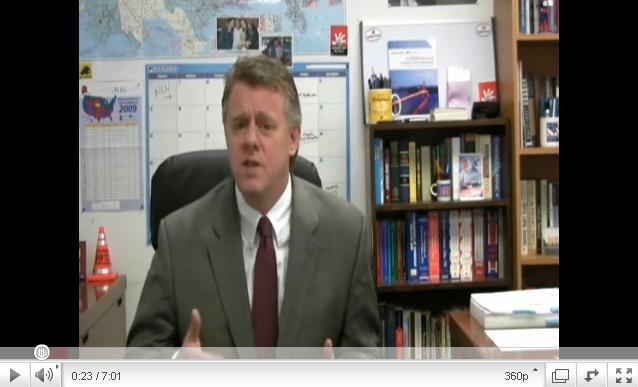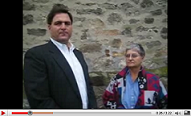Staff’s blog
“Don’t Mess With Big Spring, Texas Citizens” should be the saying I think. As you may recall, Brandon Holmes and I traveled to Big Spring at the beginning of this year after citizen rights were violated by the city council.
It seems that the citizens of Big Spring are continuing their push for initiative and referendum rights:
A hearing will be held next Thursday, December 9th at the US Court of Appeals for the 4th Circuit in Richmond, VA to determine whether Maryland’s election law imposes constitutionally impermissible limitations on the right of referendum by requiring an excessive “triple match” on petition signatures. The case is called Paul Kendall v. v. Ann Balcerzak and will be heard by Panel III, Courtroom 3, Room 223 at 9:30 AM.

It’s something we don’t see much here in America: politicians voting to expand initiative rights. The European Citizens’ Initiative is a new instrument introduced by the Lisbon Treaty whereby one million citizens may ask the European Commission to propose a new EU law. Yesterday the Constitutional Affairs Committee voted to make it easier to sign a petition and lowered the threshold of member states needed to qualify a measure. You can read more here.
As you may remember, we opposed Arizona’s Proposition 112 which was on the state ballot earlier this month. The proposition would have shortened the amount of time citizens have to collect petition signatures. The proposition lost by less than 200 votes so a recount is mandatory.
The interesting thing about this recount of the election results for Proposition 112 is that it will be the first in state history for a ballot measure:
 When calling for restrictions on the voter initiative process, initiative opponents often pull out the tired old argument that citizen initiatives lack the amount of deliberation and consideration that is said to accompany the traditional legislative process. Because they have committee hearings, legislators make better laws - or so the story goes.
When calling for restrictions on the voter initiative process, initiative opponents often pull out the tired old argument that citizen initiatives lack the amount of deliberation and consideration that is said to accompany the traditional legislative process. Because they have committee hearings, legislators make better laws - or so the story goes.
Our poll on support for recall is still open, so if you haven’t voted yet please do.
Here’s how the current breakdown stands for our poll:

Following the overwhelming passage of a legislature-referred amendment to Oklahoma’s constitution that forbids the consideration of Shariah law in state proceedings, a federal judge has extended a temporary restraining order against enforcing the law. The measure sparked a lawsuit after being approved by over 70% of Oklahoma voters.
Weigh in with your opinion on recall!
In addition to placing initiative & referendum measures on the ballot, citizens in many towns, cities, and states may also recall an elected official by collecting petition signatures. If enough signatures are collected, a vote is held to determine whether that official is removed from office and a new one is elected.
How would you describe your level of support for citizens being able to recall an elected official?
- Support
Supporters of a measure that would tax billboards in West Hollywood, CA are claiming that a trio of city council members are working to suppress their initiative rights. According to a media release, councilman Jeffery Prang led the attack on the qualified ballot measure in a late night city council meeting  His ammunition was provided, the group says, by the major Billboard Companies, like CBS Outdoor who profits tens of millions of dollars from Billboards and Supergraphics in West Hollywood.
 Arizona’s first-ever mandatory recount on a ballot proposition election has been triggered by the slim margin of votes against Proposition 112. Opposed by Citizens in Charge and other good government groups, Prop 112 would reduce the time voters have to collect signatures by two months. Under Arizona law any ballot measure election that has a margin of less than 200 votes must undergo a recount.
Arizona’s first-ever mandatory recount on a ballot proposition election has been triggered by the slim margin of votes against Proposition 112. Opposed by Citizens in Charge and other good government groups, Prop 112 would reduce the time voters have to collect signatures by two months. Under Arizona law any ballot measure election that has a margin of less than 200 votes must undergo a recount.
Last week the Tenth Circuit U.S. Court of Appeals struck down a Colorado campaign finance law requiring any group that spends more than $200 on political activities to register as an “issue committee”. The court found that the $200 threshold was too low, and that the campaign rules were too complex.
“The average citizen cannot be expected to master on his or her own the many campaign financial-disclosure requirements set forth in Colorado’s constitution, the Campaign Act, and the Secretary of State’s Rules Concerning Campaign and Political Finance.”
After blogging yesterday about traffic enforcement cameras in Ohio, a reader pointed me to this excellent breakdown of red-light and speed camera votes around the country from TheNewspaper.com. According to the article, the cameras have never survived a public vote: they usually lose by margins of two-to-one.
Among the five additional communities to ban cameras is Houston, Texas - America’s fourth largest city:
It seems that just about the only people who like red-light and speed enforcement cameras are the politicians and bureaucrats who bring in the ticket money and the companies who profit by making the cameras themselves. Citizens all over the country have organized against the devices, many calling them “highway robbery.” In several Ohio cities citizens have been able to use their initiative and referendum rights to prevent or remove the cameras, and a group that has successfully lead anti-camera petition efforts is taking on a Cleveland suburb’s cameras before they start ticketing.
Note: You can listen to an archive of the show here.
Listen Thursday, November 11, 2010 from 2-3 pm here on the Progressive Radio Network to hear the story behind “Ordinary People Doing the Extraordinary: The Story of Ed and Joyce Koupal and the Initiative Process,” authored by Dwayne Hunn, PhD., MA, Executive Director of Peoples Lobby.

